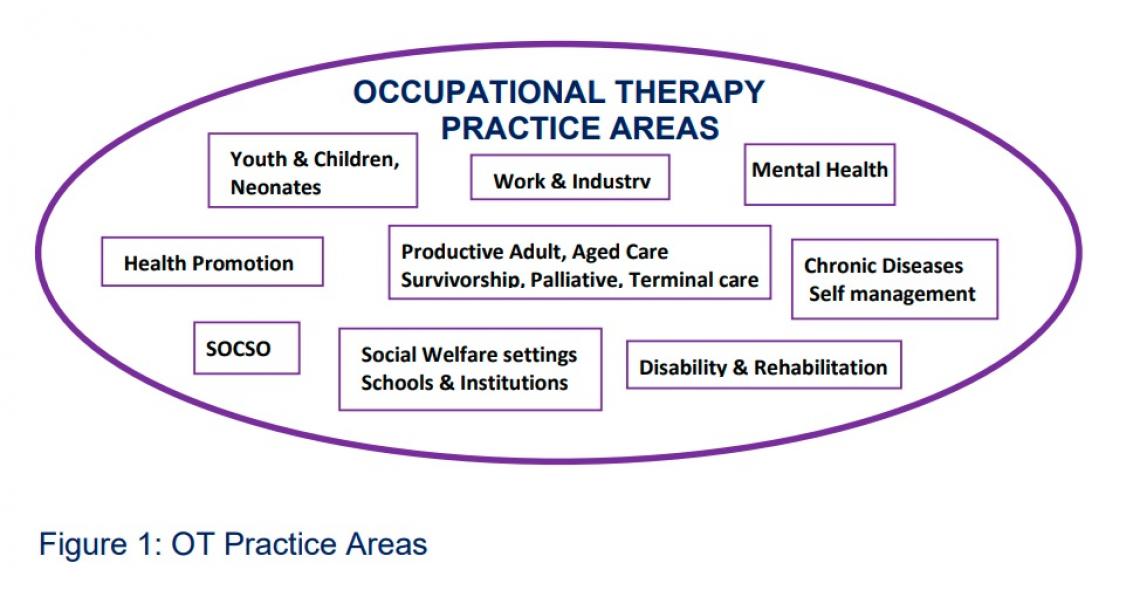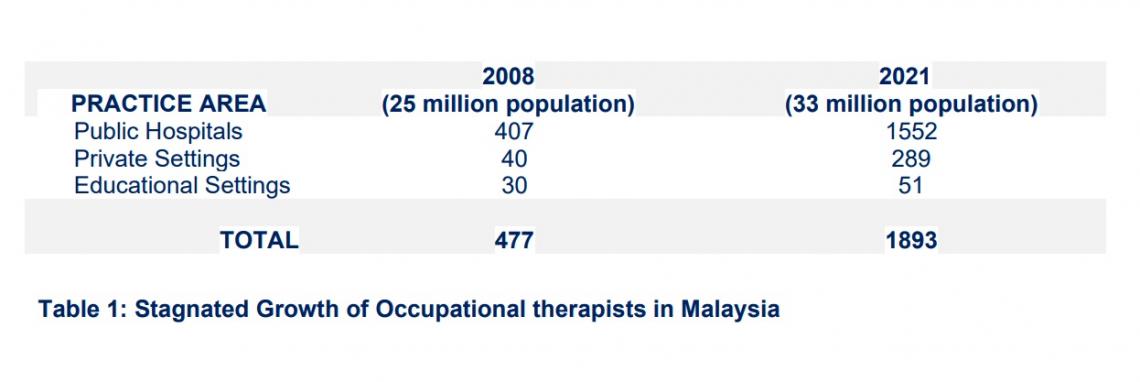A timely and evidence-based perspective
Occupation Therapy (OT) is a newer field to healthcare in developing countries, where many people, including some healthcare professionals seems to have little to no knowledge about. In simple terms, occupational therapy is an autonomous science-based, therapeutic service to treat patients/clients to help them overcome or adapt to their functional limitations, thereby enabling them towards functional outcomes for independence in daily living. The OT intervention process involves a tacit complex and intricate series of analytical and professional reasoning that involves activity analysis of the person-occupational demands, with the client -as a person rather than just a diagnosis, in order to help them target optimal level of independent occupational performance. OT work inter-professionally with any health/medical/social discipline who are relevant to the particular patient group. The OT profession is not under the governance of any medical subspeciality, but it is governed by the World Federation of Occupational Therapists to ensure its science-based foundation is developing as an independent, unique field, globally. The goal of improving ‘occupation’ and ‘occupational performance’ is the key emphasis of intervention. Occupational performances (i.e., the range of functional tasks and activities to be performed throughout life- meaningfully, purposefully and independently by the individual), is the unique motivators for setting the client-cantered, functional goals to attain quality of life. The irony is although the profession champion independence for its clients, its own independent functioning is occupationally violated in less developed countries. It’s a timely and evidence-based call for all healthcare/educational settings to embrace global practice for OT as an autonomous interdisciplinary profession in their tertiary education and in healthcare delivery system. The aim of this article is to correct the entrenched misconception across Asia, that Occupational Therapists are under the governance of rehabilitation doctors. Occupational Therapy is an autonomous, science-based discipline.
Science-based discipline with impact of effectiveness on health system
Globally, the medical literatures support the cost-effectiveness and the impact of offering occupational therapy services as part on any health care system. However, across Asia, the professional contributions of occupational therapy are continuously stifled by a lack of knowledge, poorly-informed decision-makers and low workforce representatives. Additionally, its concepts of everyday functional therapy are marred by the attempt of medical practitioners in an entrenched medical-model era, to govern the newer health professions. Such institutional barrier creates debilitating barricades to the growth of these health profession, but also unjustly limiting interdisciplinary access from other profession directly to the OT. As a recognized, autonomous health profession, occupational therapy collaborates directly with all relevant discipline/s to integrate health and social wellness, in the context of addressing their clients’ living goals. The theoretical frames of references of OT are uniquely developing the profession, and all over the world, having independent clinical department and educational faculty established, has helped to enhance developing its science-base, in tandem with international best practices.
The scope of OT is beyond mere rehabilitative
Rehabilitation is only one part of OT services continuum which extend from neonatal interventions to palliative/ end of life supportive therapy. The economic impact of having direct OT services as part of health care provision is even more critical today, given the reality of an ever-shrinking healthcare budgets that demands efficient services for the population - to cut unnecessary middlemen services to save cost and time. The International Labour Organisation have cautioned that 40 percent of the world’s population have no health insurance nor are able to access national health services resulting in debilitating consequences—where 100 million people fall into poverty due to health expenses (Razavi, 2020). Improving access to direct quality services that are relevant, without frills and middleman helps address the current shrinking healthcare budget. Interdisciplinary care of OT also includes direct collaborative work with independent institutions like prisons, drug-centre, woman/child/adolescent centres. In promoting a cost-effective direct model, fragmentation of care, duplication of services, unnecessary health expenditures should be eliminated to promote satisfaction among patients. These values make OT a popular discipline, with its evidence-based interventions across its established range of practice areas. As early as 1950’s, the profession has accelerated in education, research and knowledge dissemination in the more developed countries. Position statements on the profession’s autonomy status, and its responsibility for self-governance have been issued by its World Federation for less developed countries facing with lower profession-literacy level.
Occupational Therapy in the World and in Malaysia
The entry level credential for the profession is at the bachelor degree as the most basic requirement. Currently, entry level masters are sought in North America, while in the United States, doctoral level practitioners are in demand. Unfortunately, despite 50 years of existence in the Malaysia Healthcare System, occupational therapy is underdeveloped, and stagnated in a colonial era of a diploma-level apprenticeship training, and under a debilitating medical hegemony system. Occupational Therapy in Malaysia is critically low in numbers and are lacking in quality University-based education. For a country which is now classified as upper middle income, Malaysia has one of the lowest ratio of ‘Therapists-to-Patient’ population in the world. In 2010, the ratio of occupational therapist per 10,000 population is a low 0.20percent (NHEW, 2010). The primary issues faced by the Malaysian OT include a lack of university-based educational programs, to proactively plan for a greater qualitative therapy workforce. This failure can be attributed to low literacy level of policy makers on these newer professions, a lack of professional leadership representation, occupational injustices and violations, an entrenched medical-model governance, a lack of higher willpower to revamp/upgrade its educational training to be congruent with the profession’s growth internationally. As of 2021, there is a mere 1,893 occupational therapists for a population of 33 million (see Table below). In comparison, a small country like Sweden, with barely 10 million population, has approximately 1000 qualified occupational therapists- mostly doctorate-educated to serve their nation and are leading the contribution for the field of occupational science. In The University of Alberta in Canada, the Faculty of Rehabilitation Medicine have long established professional entry Master programs in Occupational Therapy (with Speech-Language Pathology, and Physiotherapy) but also on research based MSc/PhD programs in Rehabilitation Science (https://www.ualberta.ca/rehabilitation/index.html).
Occupational Therapy for the next decades
Overall, Malaysia’s occupational therapy service continuum system is critically underdeveloped, marred by a non-evidence governance by rehabilitation doctors- a ‘mediator’ practice infringement which is not sanctioned by the World Federation of Occupational Therapists. Across Malaysia and some parts of Asia, therapists are battling not with issues on how to progress, but with debilitating oppressions and suppressions, from an illegal dominance by physiatry (Ovretveit, 1985; Eaton & Webb, 1979; Wilding, 2011) – opening up doors for professional autonomy to be trampled by an outdated ‘middleman’ model (Loh et al 2020). Malaysia’s failure to invest in the educational upgrading of its major health care team member such as the occupational therapists is to disregard a known cost-effective intervention contributor to healthcare and towards expanding this science-based profession. In the USA, NIH have proactively launched initiatives on addressing the emerging rise in the Covid Long Haul patients with residual persistent symptoms, taking a form of chronic conditions with impacts on the functional capacities of people, who will be in need of cost-effective occupational therapy services. A 2021 paper on global survey on impact of Covid for OT have important recommendations for collaborative efforts on; development of standards and supports to promote quality OT services; and advocacy to promote access to occupational therapy and to address occupational injustices. More research is needed to stimulate rapid research on the neglected domain of occupational participation during the Covid19 lockdown, but also on many aspects in the field to develop its science based. It is timely for all public universities to implement its OT programs, starting with a bachelor/honour degree that provides either an independent degree or a dual-degrees with more established international programs, with later postgraduate subspecialisation to ensure that the country has its workforce well equipped at the proper level and accreditations, to contribute to healthcare, social-welfare system.
Authors
Assoc Prof Dr Loh Siew Yim
Senior Lecturer
Faculty of Medicine
University of Malaya
Dr Gail Boniface
Reader
University of Cardiff, UK
Prof Sharon Britnell
Professor Emeritus
Faculty of Rehabilitation Medicine,
University of Alberta, Canada
Source:
- NHEW (2010) National Healthcare establishment workforce statistic. Ed: Tahrani PK, Sivasampu S, Goh PP, Faizah A, Hisham AN (2010). https://www.crc.gov.my/wp-content/uploads/documents/report/NHEWS_Hospitals_2010_FullReport.pdf
- Razavi, S. (2020) International Labour Organization, COVID-19: Social Protection Systems Failing Vulnerable Groups, 25 March 2020. Available at http://www.ilo.org/global/about-the-ilo/newsroom/news/WCMS_739678/lang--.... htm
- Loh, SY. (2012) Occupational Therapy in Malaysia– a chaotic state of (dys)autonomy. April 2, 2012. 4S2.4 Oral presentation for the 2012 Hong Kong International Occupational therapy conference. http://www.hkiot. org/2012otc/eng/ppt_eng.php.
- Loh, SY., Boniface, G., Mackenize, L, & Richards L. (2017) Professional Autonomy and Progress of Occupational Therapy - A Case Study on a Neglected Health Profession in Malaysia. Journal of Hosp Health Care Admin: JHHA-2017, 105. DOI: 10.29011/JHHA-105. 100005
- Loh, SY; Boniface G, Mackenzie L & Richards L. (2020) Occupational therapy profession for women's health: Challenges for its under developed services. Asia Journal of Occupational therapy Vol 16(1) 35-43
- Weber, D. (2016) Medical hegemony. Int J Complement Alt Med 2016, 3(2): 00065. http://medcraveonline.com/IJCAM/IJCAM-03-00065.pdf
- Ovretveit J (1985) Medical dominance and the development of Professional autonomy in Physiotherapy . Socioiogy of Health and Illness. Vol. 7 No. 1 (1985 0141-9889/85/0301-0076)
- Eaton G & Webb B (1979) 'Boundary encroachment, pharmacists in the clinical setting'. Sociology of Health and Illness, Vol. 1, No. 1, 69-84
- Wilding C. (2011) Raising awareness of hegemony in occupational therapy: The value of action research for improving practice. Australia Journal of Occupational Therapy. Vol 58, Issue 4, 293-299




